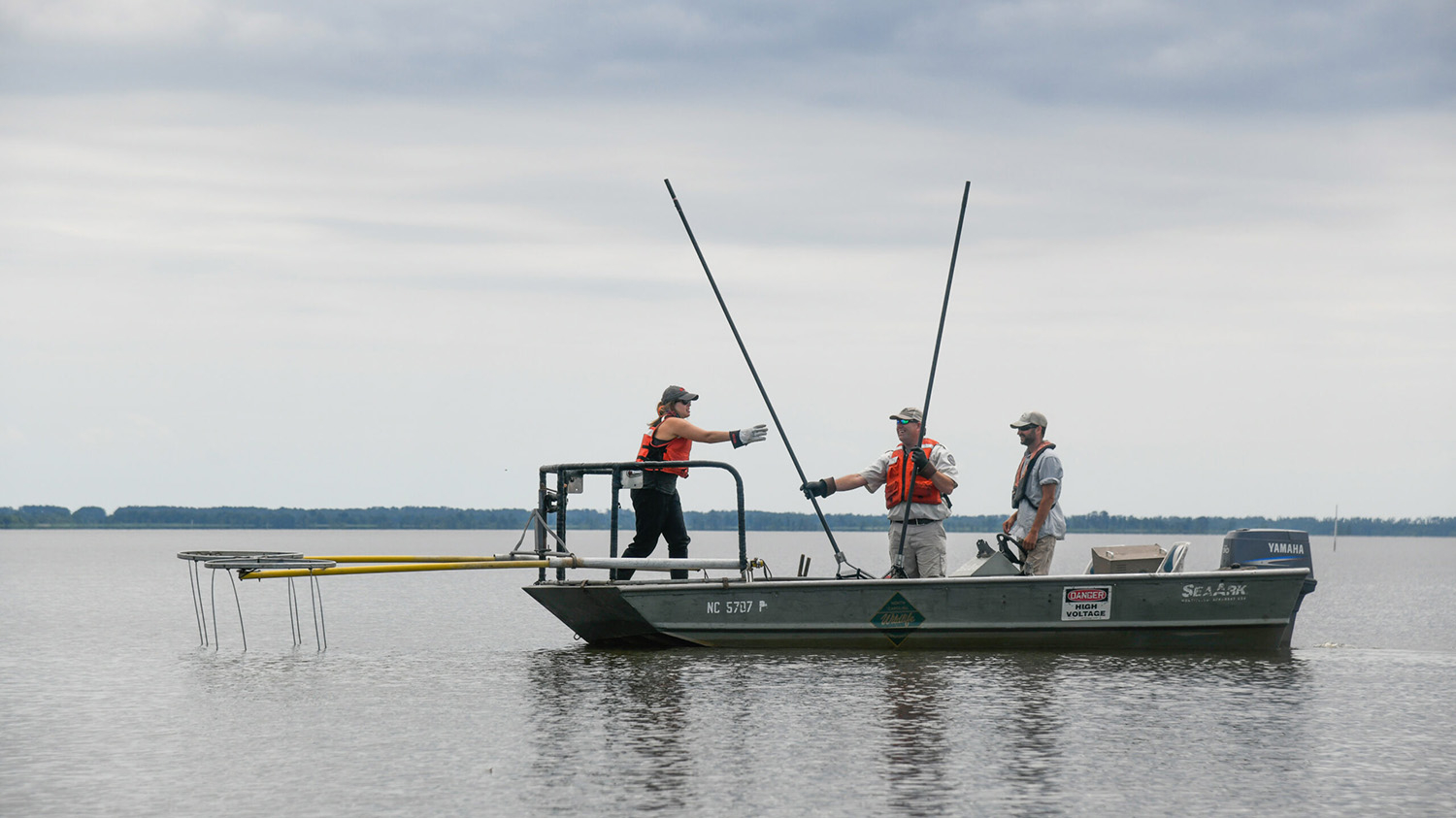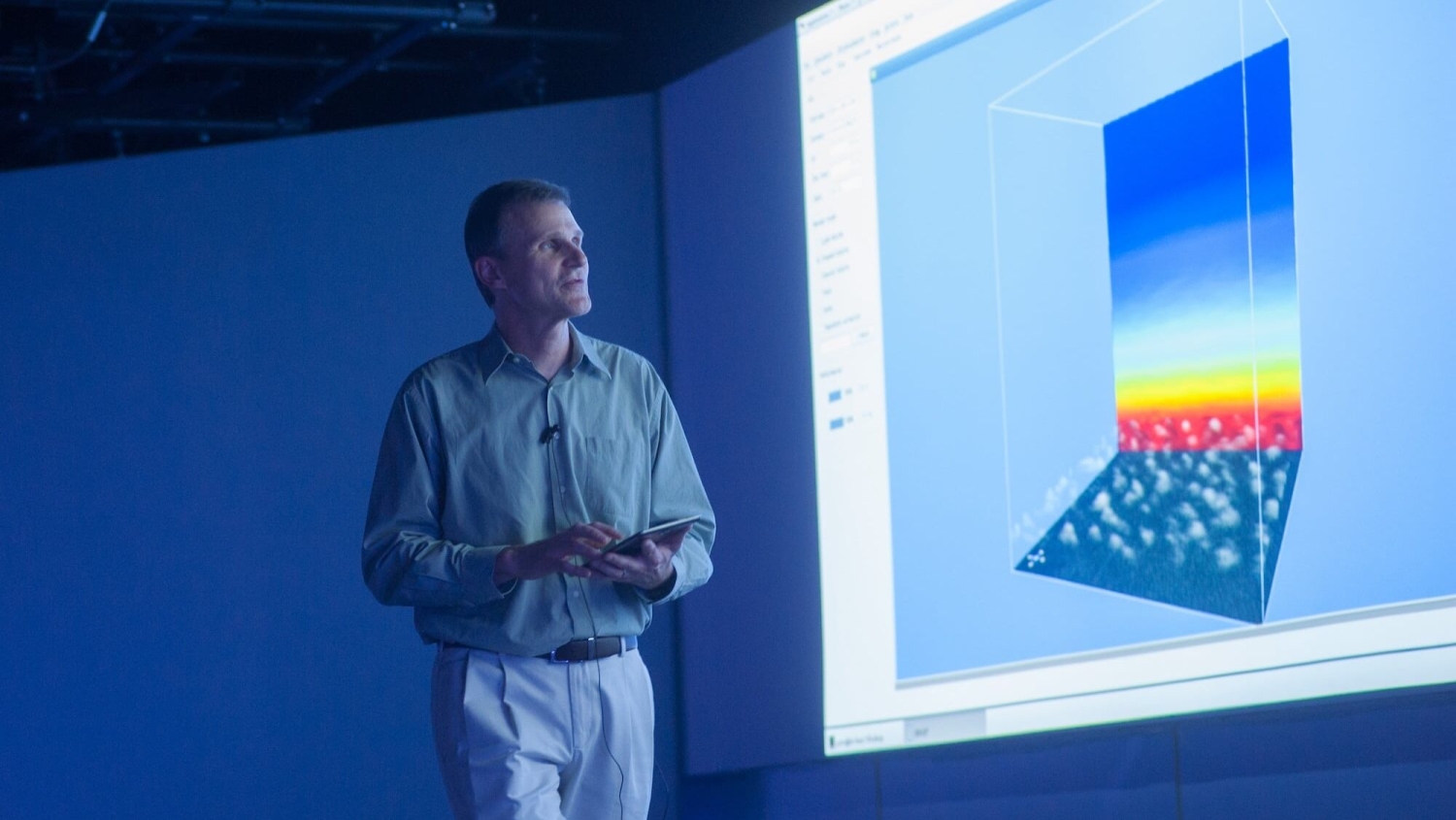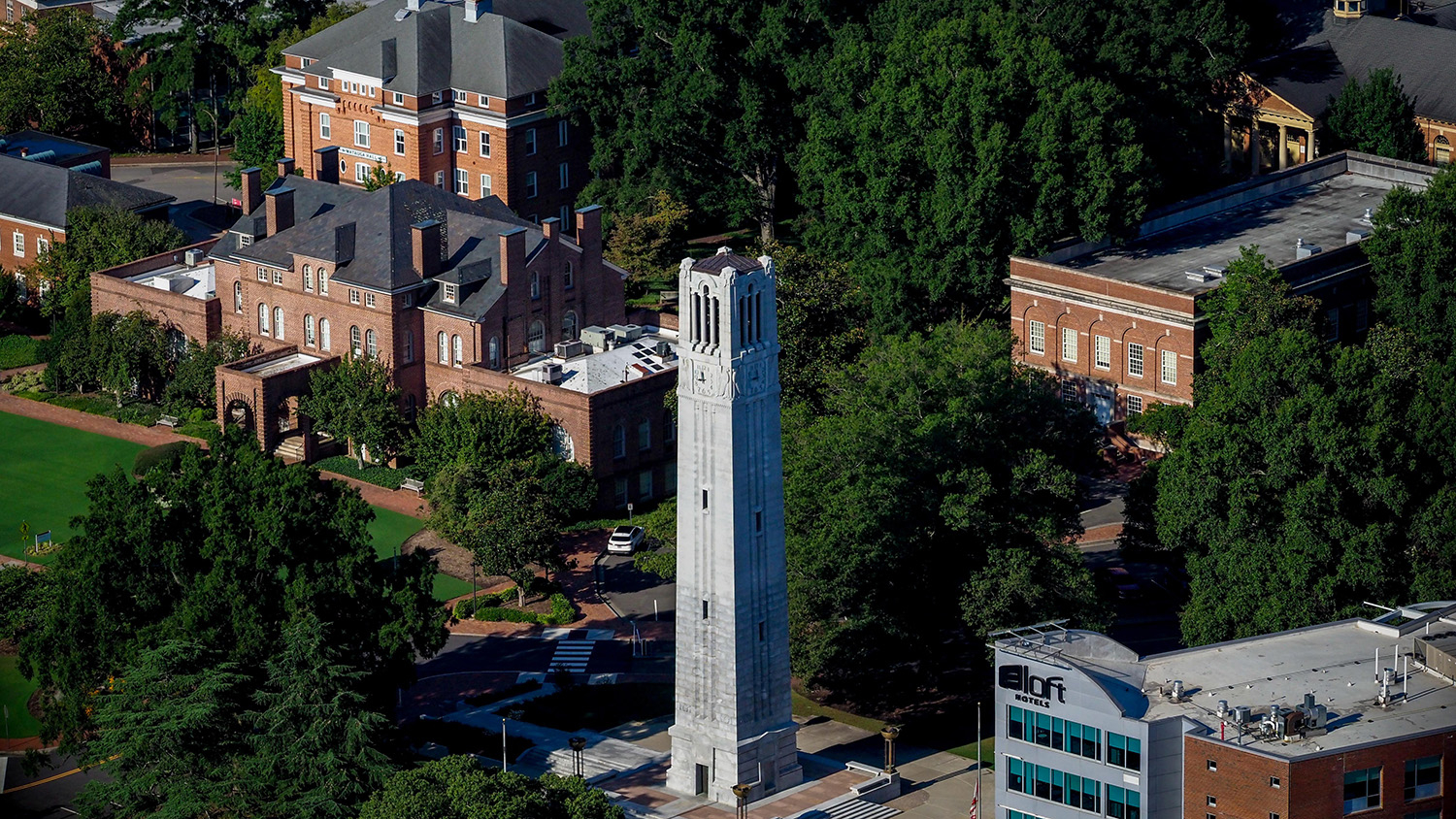Five Questions with Erin Seekamp and Chris Osburn of the Coastal Resilience and Sustainability Initiative

NC State’s Coastal Resilience and Sustainability Initiative (CRSI) envisions a future where people, ecosystems and economies are more resilient in the face of rapid social and environmental change. The CRSI seeks to leverage the university’s interdisciplinary strengths to find actionable, innovative and sustainable solutions necessary to inform the transformational choices we face in a changing climate.
We spoke with Goodnight Distinguished Professor and CRSI Director Erin Seekamp and Professor and Director of the Blue Economy Innovation Program Chris Osburn about the CRSI’s background, growth and how the initiative catalyzes transformation in a changing climate.
What inspired the formation of the CRSI? What is your mission and vision?
Erin Seekamp: In the fall of 2019, Executive Vice Chancellor and Provost Warwick Arden charged a faculty leadership team to develop an interdisciplinary coastal resilience and sustainability effort at NC State that would lead to practical solutions to address the challenges of climate change, resilience and sustainability in the coastal zone. These challenges are affecting all of North Carolina, but they are often most clearly observed in our coastal areas, where sea level rise, subsidence, storms, flooding, salinization and contaminants are challenging these ecosystems and the socio-economic systems that depend upon them.
The mission of the CRSI is to catalyze transformations in energy, development and transportation systems, as well as socio-ecological systems, through community-engaged interdisciplinary efforts focused on mitigation and adaptation solutions. We define the word “community” broadly (i.e., any collection of individuals, which could be organizations, companies, agencies, or politically or geographically defined areas or regions). The CRSI seeks to leverage NC State’s interdisciplinary strengths, centered in the new Office of University Interdisciplinary Programs (OUIP), to find actionable, innovative and sustainable solutions necessary to inform the transformational choices we face in a changing climate.
What is your role within the CRSI? In this role, how do you advance the initiative’s mission and scholarship?
ES: I was hired as director in August 2022, at which time I was also appointed as the Goodnight Distinguished Professor in Coastal Resilience and Sustainability. Directing the CRSI is an amazing opportunity to network with faculty, staff, students and external constituencies. We collaborate to identify current and future challenges. We develop and implement new interdisciplinary programs. We seed interdisciplinary research ideas and technological innovations. We launch new entrepreneurial efforts, and, we do this with communities—again, broadly defined—to ensure they are part of the process from problem framing through decision implementation. Together, we think through different futures for the coast, then identify strategies that will lead us to a more resilient and sustainable future.
This is hard work because there are difficult tradeoffs when charting a more resilient and sustainable future. Yet, I’ve been amazed by how eager faculty, staff, students and our external partners are to work together for a better future. Everyone involved in CRSI efforts are fully embracing NC State’s “Think and Do” motto.
We are also working closely with other interdisciplinary programs, such as the Global One Health Academy, the Southeast Climate Adaptation Science Center, the Sustainability Futures Initiative, the North Carolina State Climate Office, and the Kenan Institute for Engineering, Technology and Science (KIETS) Climate Leaders Program, among others, to find synergistic ways to further our collective missions. In fact, leaders of these and other programs with climate change in their missions have united to form the Climate Solutions Collaborative, a new network within OUIP under the leadership of Senior Vice Provost Rob Dunn. The website was developed and is being expanded by Campus as a Classroom intern, Sanjana Ponnapalli, Department of Computer Science, College of Engineering.
How does the CRSI support education, trainingx and workforce development, along with improving the lives of North Carolinians?
ES: The CRSI has two flagship programs, the Blue Economy Innovation Program (BEIP), directed by Dr. Chris Obsurn, and the C-CRITers (Coastal Community Resilience Immersive Training) program, under the leadership of Dr. Rebecca Ward, a CRSI postdoctoral research scholar, and Dr. Georgina Sanchez, a research scholar with the Center for Geospatial Analytics. I’m going to let Dr. Osburn tell you more about the BEIP after I share more about the C-CRITers program.
The C-CRITers program is a new partnership with Conservation Corps North Carolina with supporting funding from OUIP and KIETS. We are training six Americorps members to serve as assessment coordinators who will create asset maps and vulnerability assessments of those assets with and for coastal communities who may not have the human or financial capital to do so themselves. This program will include community engagement to help identify additional assets, like culturally important spaces, as well as localize some of the climate impacts that are already being realized but not captured in downscaled climate predictions, such as areas of recurrent flooding. Ultimately, the students will provide these under-resourced yet climate vulnerable coastal communities with key documents needed to be able to identify and prioritize coastal resilience and sustainability projects, which will help communities secure government funding for those projects.
The inaugural group of six NC State students serving as Americorps members will start in May 2024 and they will spend 10 weeks in these paid positions, providing them with valuable experiences and communities with critical documents. Congratulations to this year’s cohort of AmeriCorps Assessment Coordinators: Lexy Boudreau (environmental engineering major; science technology and society major), Emma Hester (environmental engineering major), Roselyn Hopp (industrial engineering major; environmental science minor), Katherine Judy (biological and agricultural engineering technology major), Mckinley Richardson (biological and agricultural engineering technology major) and Jack Voight (environmental engineering major; film studies minor)!
Chris Osburn: The Blue Economy Innovation Program, or BEIP, is a campuswide program whose mission is to inspire innovation and entrepreneurial thinking in undergraduate and graduate students as well as faculty to solve the challenges of ocean sustainability. We grew out of an initiative that started just after the launch of CRSI and was formalized under Dr. Seekamp’s leadership, with support from the College of Sciences, NC State Innovation and Entrepreneurship and OUIP.
We’re in the Ocean Decade and the BEIP is NC State’s effort to make strides in Challenge 4, which is to develop a sustainable and equitable blue economy. We define the blue economy as the sustainable use of the ocean for the benefit of all. As the global population grows, we’re going to demand more from the ocean and we need to ensure that demand is met sustainably. NC State has expertise in all sectors of the blue economy ranging from fisheries and aquaculture to tourism to coastal engineering and marine data analytics. Plus NC State has extension services serving coastal communities.
To this end, the BEIP hosts an annual workshop in collaboration with Carteret Community College at NC State’s Center for Marine Science and Technology (CMAST). We’ll hold our third workshop in February 2024 and we will convene a panel of innovators and entrepreneurs in the ocean technology startup space as well as a panel focused on building a climate-ready coastal workforce. Students work with subject matter experts to build teams based on shared interests that can develop an innovative idea — be that a product or service or research project. Importantly, we connect them with the resources needed to pursue their innovations. We have also hired a student with a passion for event management, Ali Curtis (communications major), to help us coordinate the workshop.
What plans does the initiative have for the coming year? What opportunities do you plan to pursue?
ES: Our next event is coming soon. Mark your calendars for Feb. 27 at 2 p.m. to join us for an interesting conversation with Dr. Gavin Smith (NC State) and Dr. Wendy Saunders (New Zealand Earthquake Commission) as they discuss international lessons on managed retreat. Register here for the event. Often referred to as “buyouts” in the United States, the acquisition of hazard-prone housing is a necessary approach to building climate resilience and sustainability and is increasingly being discussed as part of a larger managed retreat strategy. Drs. Smith and Saunders research the practice and policy of managed retreat and will share an overview of their scholarship and recent collaborative endeavors, to include an international learning lab under development by Dr. Smith and colleagues at universities, centers and municipalities in Australasia, Europe and the United States. A panel discussion will follow.
In April 2024, we are working with an amazing planning team of willing volunteers from NC State, NC Sea Grant, the Southeast Climate Adaptation Science Center, the Museum of Life and Science, and the Environmental Defense Fund to coordinate a 120 person workshop in which faculty, postdocs and graduate students will envision transformations in North Carolina’s coastal plan and external practitioners, policymakers and knowledge experts. The goal will be to envision possible futures for the coastal plain in 2050, 2075 and 2100, while identifying the research, education, engagement and policy needs to support the necessary transformations to support those visions. They will be considering, for example, the types of crops that will be supported by the predicted climate at those years, where critical agricultural lands need to be conserved, where human population growth and economic development opportunities would be best suited, where wetlands will need to migrate, how to support the migration of wildlife and their habitat, and how to accommodate the needs of our military.
What is something that the NC State community may not know about the CRSI?
ES: There are more than 240 faculty and staff across the 10 colleges and several other units at NC State self-aligned with the CRSI — and any faculty and staff can join by completing the form on our website’s directory. We send a bi-monthly email to our network that includes relevant funding opportunities, on-campus events, opportunities for students, and jobs and fellowship opportunities. Last spring over 50 CRSI members attended a two-day event where two new research ideas were selected for seed funding — and these collaborations continue and evolve into new endeavors, like the Research and Innovation Seed Funding program award that will establish See Salt, a coastal aquatic monitoring network that engages oyster growers to generate near real-time and open salinity data. The project team will test low-cost salinity monitoring equipment developed by NC-based oyster farmers and engage growers to develop a strategy for future expansion of the See Salt network. Congratulations to Dr. Natalie Nelson (associate professor, Department of Biological and Agricultural Engineering, College of Agriculture and Life Sciences), Dr. Marcelo Ardón (associate professor, Department of Forestry and Environmental Resources, College of Natural Resources), Dr. Whitney Knollenberg (associate professor, Department of Parks, Recreation and Tourism Management, College of Natural Resources), Tal Ben-Horin (assistant professor, CMAST/College of Veterinary Medicine), Eric Herbst (specialist, CMAST/North Carolina Sea Grant) and Dr. Chris Osburn for this new collaboration that embraces the CRSI’s approach to support science innovation and education with and for communities, so that we can bounce forward when disturbances and change occur by transforming to a more just and sustainable future state of environmental, social and economic conditions.
CO: The idea for BEIP started out of my prior experience working for the Navy where scientists were encouraged to commercialize their research, very much in the spirit of NC State’s “Think and Do” motto. Once CRSI established the Blue Economy Working Group with faculty, we realized we needed a broad perspective that included voices external to the university. We now have an advisory panel that includes representatives from venture capitalists and angel investor firms, incubators and accelerators, as well as faculty. NC Sea Grant, the State Climate Office, Colleges of Sciences and Natural Resources, as well as the Provost’s Office and KIETS all have been foundational sponsors of the BEIP and its workshop. Also, there is now a course, MEA 493/591 Interdisciplinary Innovation in the Blue Economy, that is being offered for the first time in spring 2024 and will move to a regular offering each fall semester starting in August 2024. It’s open both to undergraduates and graduates and expands beyond the workshop, which will take place concurrently. There is no prerequisite and the course is open to all majors! Finally, the BEIP is partnering with other North Carolina colleges and universities to build a regional hub of innovation that highlights North Carolina’s potential to lead the blue economy.
This post was originally published in Provost's Office News.


